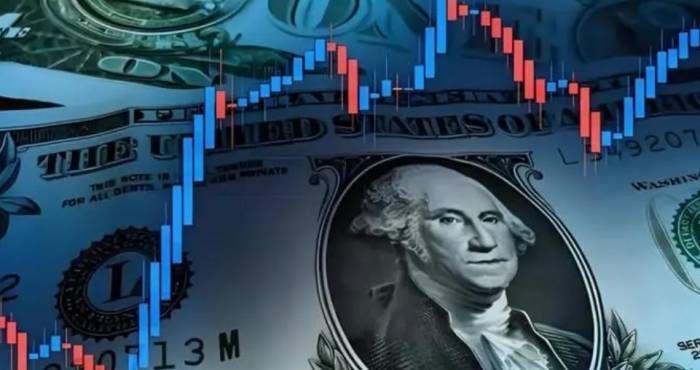Nasdaq Down Over 1%, Chip Stocks Slide, Chinese ADRs Plunge Nearly 6%
**U.S. Stock Market: Major Indices Close Lower**
* Major U.S. Indices Decline
* Chinese Concept Stocks Plunge Nearly 6%
* Nvidia Retreats from Highs, Chip Stocks Under Pressure
The three major U.S. stock indices closed lower on Tuesday, with the Nasdaq Composite leading the decline with a 1% drop as investors assessed the latest batch of earnings reports from companies like Citigroup and Bank of America. Chip stocks fell due to demand concerns, while the energy sector plummeted 3% as oil prices dropped.
At the close, the Dow Jones Industrial Average fell 324.80 points, or 0.75%, to 42,740.42; the Nasdaq Composite dropped 187.10 points, or 1.01%, to 18,315.59; the S&P 500 index declined 44.59 points, or 0.76%, to 5,815.26.
The S&P 500 energy sector closed down 3%, marking the largest single-day drop since early October 2023, as oil prices fell and demand expectations declined following media reports that Israel would not target Iranian oil facilities.
Advertisement
Affected by ASML's downgrade of its 2025 net sales and gross margin guidance, the U.S. chip stock sector generally moved lower. The Philadelphia Semiconductor Index closed down 5%, marking the largest single-day drop since early September. Nvidia fell 4.5% after hitting a new closing high on Monday; AMD dropped 5.2%.
Popular Chinese concept stocks broadly declined. The Nasdaq Golden Dragon China Index closed down 5.92%. Alibaba fell 5.5%, and JD.com fell 9%.
Apple Inc.'s stock price extended gains on Tuesday, closing up 1.1% at $233.85, a record high. Apple announced the launch of a new iPad mini on Tuesday, the first update to the iPad mini since 2021.
Evercore ISI gave Apple a "tactical outperformance" rating. The company is expected to report earnings later this month. Evercore said in a report: "Bearish investors remain focused on the smartphone market, but we believe the risks are overblown and can be offset by growth in emerging markets and a strong upgrade cycle in the U.S. Our surveys show strong upgrade demand, partly driven by artificial intelligence."Citigroup, Bank of America, and others reported mixed earnings on Tuesday.
Bank of America's third-quarter profit exceeded expectations, with shares closing up 0.5%; Citigroup fell 5% after the company reported mixed results, with net income declining and net interest income lower than expected, while debt underwriting supported the performance of its investment banking business.

Walgreens Boots Alliance reported better-than-expected adjusted profit for the fourth quarter and announced plans to close 1,200 stores to cut costs, causing its shares to surge 15.8%.
"There seems to be more pressure on chip stocks," said Kevin Gordon, Senior Investment Strategist at Charles Schwab, "which is putting downward pressure on the tech sector." He further stated that the number of advancing and declining stocks in the Nasdaq Composite was roughly equal, and the stocks sold off that day had previously performed well. "This suggests that it is the mega-cap stocks that are dragging down the index."
On Monday, U.S. stocks closed higher, with the S&P 500 and the Dow both hitting intraday and closing historical highs, with the Dow closing above 43,000 for the first time. Scott Chronert, a U.S. equity strategist at Citi, believes: "The S&P 500 is at least considerably overvalued. But as long as there is support from news, this situation can continue."
In terms of economic data, a report released by the New York Fed showed that New York State's October manufacturing index fell by 23.4 points to a five-month low of -11.9, below zero indicating a state of contraction. The data was much lower than the widely estimated 3.0 by analysts.
The report showed that the new orders index plummeted to -10.2 in October, while shipments fell to -2.7. In addition, although the employment rate rose by 9.8 points to 4.1, both the price paid index and the price received index increased, indicating increased inflationary pressure.
On the other hand, the index of expectations for economic activity over the next six months rose to a three-year high of 38.7, indicating that manufacturers in the state are more optimistic about the economic outlook.
Analysts believe that these data further confirm that the U.S. economy is becoming increasingly polarized, with some households doing well and others struggling. In the past few months, the rise in the stock market has driven the total net worth of households to a record level, but many Americans do not hold a large number of stocks, and debt has increased in recent years amid rising interest rates.
Earlier on Tuesday, San Francisco Fed President Daly said that as inflation declines and the labor market cools, the Federal Reserve must remain vigilant, but she is optimistic that officials can maintain the momentum of the current economic expansion. "We have seen some of the same patterns in the current expansion. The labor force participation rate of prime-age workers has reached a new high. Compared with recent history, the current economic expansion is still in a relatively early stage," she said.Data released since the Federal Reserve's September meeting has shown that last month's hiring activity was stronger than expected, with core inflation rising more than anticipated, prompting several Federal Reserve officials to express their support for a more gradual approach to rate cuts in the future. Daly stated on Tuesday that the Federal Reserve's inflation and employment targets are currently in balance, adding that Federal Reserve officials must continue to commit to maintaining a strong labor market while keeping inflation at the 2% target.
According to data from the CME FedWatch Tool, traders have raised their expectations for a 25 basis point rate cut by the Federal Reserve in November to approximately 98%.
In the commodity market, international crude oil futures closed sharply lower on Tuesday. WTI crude oil futures fell by $3.25, a decrease of 4.4%, to $70.58 per barrel.